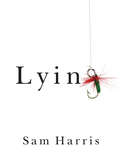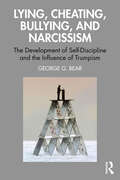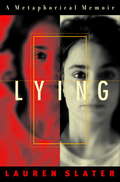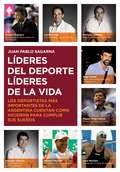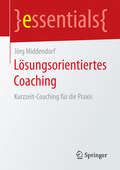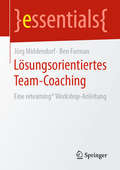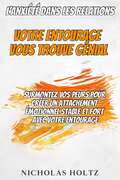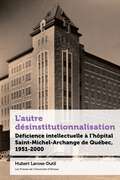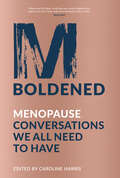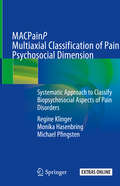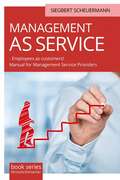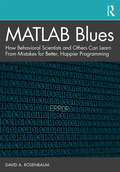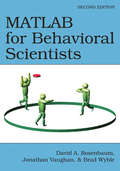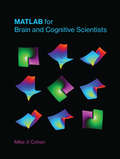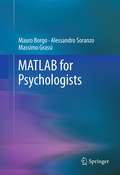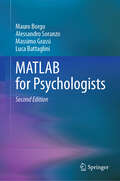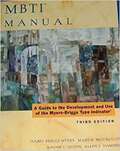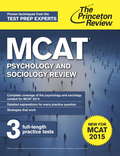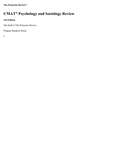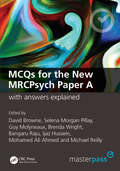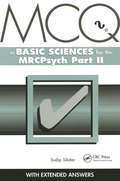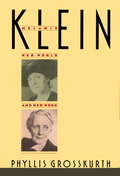- Table View
- List View
Lying
by Sam HarrisAs it was in Anna Karenina, Madame Bovary, and Othello, so it is in life. Most forms of private vice and public evil are kindled and sustained by lies. Acts of adultery and other personal betrayals, financial fraud, government corruption-even murder and genocide-generally require an additional moral defect: a willingness to lie.In Lying, best-selling author and neuroscientist Sam Harris argues that we can radically simplify our lives and improve society by merely telling the truth in situations where others often lie. He focuses on "white" lies-those lies we tell for the purpose of sparing people discomfort-for these are the lies that most often tempt us. And they tend to be the only lies that good people tell while imagining that they are being good in the process.
Lying and Christian Ethics
by Christopher O. TollefsenLying and Christian Ethics defends the controversial "absolute view" of lying, which maintains that an assertion contrary to the speaker's mind is always wrong, regardless of the speaker's intentions. Whereas most people believe that a lie told for a good cause, such as protecting Jews from discovery by Nazis, is morally acceptable, Christopher Tollefsen argues that Christians should support the absolute view. He looks back to the writings of Augustine and Aquinas to illustrate that lying violates the basic human goods of integrity and sociality and severely compromises the values of religion and truth. He critiques the comparatively permissive views espoused by Cassian, Bonhoeffer, and Niebuhr and argues that lies often jeopardize the good causes for which they are told. Beyond framing a moral absolute against lying, this book explores the questions of to whom we owe the truth and when, and what steps we may take when we should not give it.
Lying, Cheating, Bullying and Narcissism: The Development of Self-Discipline and the Influence of Trumpism
by George G. BearThis vibrant book examines individual and societal factors contributing to the rise of lying, cheating, bullying, and narcissism, with emphasis on the influence of Trumpism and the valuing of “getting things done” over the importance of self-discipline and issues of morality. George Bear explores individual and environmental factors that influence the development of self-discipline. He examines reasons for the growing prevalence of lying, cheating, bullying, and narcissism and their underlying factors, and the role of parenting and peer relationships in their development. The volume highlights the critical roles that moral reasoning, moral emotions, and mechanisms of moral disengagement play in dishonest and harmful behavior. Lying, Cheating, Bullying, and Narcissism is for students and scholars of child development, parenting, psychopathology, and criminology; professionals in psychology, mental health, and education; as well as others interested in the prevalence and roots of lying, cheating, bullying, and narcissism in America.
Lying: A Metaphorical Memoir
by Lauren Slater"The beauty of Lauren Slater's prose is shocking," said Newsday about Welcome to My Country, and now, in this powerful and provocative new book, Slater brilliantly explores a mind, a body, and a life under siege. Diag-nosed as a child with a strange illness, brought up in a family given to fantasy and ambition, Lauren Slater developed seizures, auras, neurological disturbances--and an ability to lie. In Lying: A Metaphorical Memoir, Slater blends a coming-of-age story with an electrifying exploration of the nature of truth, and of whether it is ever possible to tell--or to know--the facts about a self, a human being, a life. Lying chronicles the doctors, the tests, the seizures, the family embarrassments, even as it explores a sensitive child's illness as both metaphor and a means of attention-getting--a human being's susceptibility to malady, and to storytelling as an act of healing and as part of the quest for love. This mesmerizing memoir openly questions the reliability of memoir itself, the trickiness of the mind in perceiving reality, the slippery nature of illness and diagnosis--the shifting perceptions and images of who we are and what, for God's sake, is the matter with us. In Lying, Lauren Slater forces us to redraw the boundary between what we know as fact and what we believe we create as fiction. Here a young woman discovers not only what plagues her but also what heals her--the birth of sensuality, her creativity as an artist--in a book that reaffirms how a fine writer can reveal what is common to us all in the course of telling her own unique story. About Welcome to My Country, the San Francisco Chronicle said, "Every page brims with beautifully rendered images of thoughts, feelings, emotional states." The same can be said about Lying: A Metaphorical Memoir.
Líderes del deporte
by Juan Pablo SagarnaLas imágenes de situaciones deportivas nos proveen de valiosos elementospara ser usados en nuestras relaciones. La clave es trasladar laentrega, la pasión, la perseverancia y el compromiso del deporte anuestra vida diaria, como lo demuestran estos deportistas. Existe un método para ser un líder del deporte. Y los principaleslíderes del deporte argentino lo develan aquí, a través de sus historiasde vida. Algunas de las características de este método son ladisciplina, la responsabilidad, la coherencia, la confianza, lahonestidad, el trabajo en equipo, la solidaridad, la capacidad deresolver situaciones, encontrar el modo de relacionarnos únicamente deforma positiva con quienes nos rodean y, sobre todo, detectar laoportunidad para dar definitivamente un salto de calidad.El relato de cada uno de los protagonistas de este libro sirve paraobservar y confirmar que no hay obstáculos. ¿Cómo llegaron a serlíderes? ¿En qué momento hicieron el clic que les permitió derribarcualquier barrera y convertirse en los mejores de cada disciplina?Este libro logra llevar el mensaje de estos brillantes deportistas aquienes no viven el deporte, pero sí pueden aplicar su aprendizaje encuestiones cotidianas, tanto en el trabajocomo en el plano familiar y social.
Lösungsorientiertes Coaching: Kurzzeit-Coaching für die Praxis (essentials)
by Jörg MiddendorfJörg Middendorf stellt in diesem essential die Grundlagen des lösungsfokussierten Coachings sowie einen konkreten Beratungsablauf dar und liefert damit zentrales Handwerkzeug für die Beratung. Zusätzlich regen mehr als 130 Fragen das eigene lösungsfokussierte Denken an. Der Autor spricht damit in erster Linie Coaches und Berater an, die ihre Tätigkeit durch das lösungsorientierte Arbeiten bereichern möchten. Gleichzeitig lassen sich die grundlegenden Prinzipien der lösungsorientierten Arbeit auch gut auf das Führen von Mitarbeitern übertragen. Dementsprechend werden auch Personalverantwortliche viele Anregungen für ihre tägliche Führungspraxis finden.
Lösungsorientiertes Team-Coaching: Eine reteaming® Workshop-Anleitung (essentials)
by Ben Furman Jörg MiddendorfIn diesem essential werden die Grundlagen des lösungsfokussierten Team-Coachings sowie ein konkreter Workshop-Ablauf dargestellt. Das zugrundeliegende reteaming®-Konzept von Ben Furman und Tapani Ahola ist seit Jahren und rund um den Globus praxiserprobt. Der gesamte Beratungsprozess wird Schritt für Schritt dargestellt, sodass Berater und Coaches konkretes Werkzeug zur Durchführung ihrer Team-Coachings erhalten. Zusätzlich werden für jeden Schritt Beispiele für die Visualisierung der notwendigen Flipcharts zur Verfügung gestellt. Die Autoren sprechen damit in erster Linie Coaches und Berater an, die ihre Tätigkeit durch das lösungsorientierte Arbeiten mit Teams bereichern möchten. Gleichzeitig lassen sich die grundlegenden Prinzipien auch gut auf das Führen von Teams übertragen.
L’Alzheimer: une maladie redoutable I
by Juan Moises de la Serna Bakrim NouryIssu d’une trilogie amplement consacrée à la maladie Alzheimer, ce livre a été conçu à la base de questionnements utiles. D’emblée un mot sur ses mérites pédagogiques : le livre adopte une démarche rationnelle simplifiée qui permet à tous les lecteurs concernés de comprendre le phénomène qui les accable, partant ontologiquement de la définition très fine en passant par la causalité pour enfin aboutir aux conséquences variées. En outre, son intelligence se traduit par une articulation des questionnements ‘’populaires’’ aux grands questionnements de la recherche contemporaine sur l’Alzheimer. Pour l’avoir lu et traduit, je peux affirmer que cet équilibre est réussi. Le livre est aussi utile et fiable quand il s’agit de diversifier les références aux solutions thérapeutiques ou celles concernant les résultats de l’état de l’art actuel en matière d’Alzheimer : dans ce sens bien précis, les données sont exposées avec un sens aigu de la critique qui permet non seulement de comprendre ‘’ce qui se fait’’ aux quatre coins du monde mais aussi de pouvoir adopter une vision claire sur ‘’ce qui peut être concrètement fait’’ afin de retarder voire même de guérir la dégénérescence des fonctions cognitives de la mémoire. D’autres apports seront certainement un atout pour les lecteurs concernés ou curieux: la distinction d’Alzheimer des autres démences, où il propose même une forme de diagnostic enrichi, une nouvelle méthode de prévention/d’anticipation publique et familiale très utile pour les proches par exemple. L’accent mis sur l’inefficacité pharmacologique est une autre voie de vulgarisation où les lecteurs sauront comment se situer face aux traitements médicamenteux actuellement disponibles. Enfin, trois pistes sont suggérées où l’argumentation du livre culmine avec des propositions claires : la piste génétique, la piste biologique et la piste psycholo
L’Anxiété dans les Relations: Surmontez vos peurs pour créer un attachement émotionnel stable et fort avec votre entourage
by Nicholas HoltzReprenez le contrôle de vos peurs et de vos angoisses pour devenir une meilleure version de vous-même ! Vivre dans le déni, remettre en question chacune de vos actions, penser négativement à votre avenir, vivre dans la peur de l’inconnu… Voilà de quoi gâcher votre vie et générer une anxiété constante. Si l’un de vos proches ou vous-même êtes en proie à l’anxiété, vous avez probablement déjà vécu des crises de panique, des remontrances négatives, des phobies, et vous vous sentez peut-être honteux de votre "maladie." Au quotidien, l’anxiété rend fou, même si on ne l’est pas, en fait. Comme pour tout le monde, certains jours sont meilleurs que d’autres, mais ceux qui ressentent des symptômes d’anxiété vivent généralement plus de mauvaises journées que de bonnes. Dans "Votre Entourage vous Trouve Génial", vous découvrirez : ✓ Comment l’anxiété gâche la vie quotidienne ✓ Ce qu’est l’anxiété et quelles en sont les causes ✓ Les signes et les symptômes des troubles de l’anxiété ✓ Les symptômes de l’anxiété sociale ✓ Les causes profondes de vote anxiété ✓ Pourquoi un discours intérieur négatif vous nuit ✓ Les traumas de l’enfance et la senbilité à l’anxiété ✓ Comment bien gérer vos émotions ✓ La responsabilisation face à l’anxiété ✓ L’Etat d’esprit ‘’Je peux’’ à la place de ‘’Je dois’’ ✓ Comment tenir un journal de gratitude ✓ Pourquoi utiliser la visualisation ✓ Les aspects des pratiques de visualisation réussie ✓ Comment l’estime de soi affecte votre état d’esprit, vos schemas de pensée, et votre vie en général ✓ Des étapes spécifiques, des stratégies et des techniques pour vous aider à améliorer votre estime de vous en recâblant vos voies cérébrales e
L’ansia e il giardino dentro di me: Vincendo l’ansia e tornando alle origini
by Danilo H. GomesSe soffri ancora di ansia, è perché non hai capito come funziona il tuo giardino dell'anima. C'è un mostro apparentemente invincibile che, in questo momento, perseguita la vita di persone in tutto il mondo. Questo mostro si chiama ansia e devasta le anime come un uragano. Conoscere il Giardiniere Perfetto e il giardino dell'anima, è una luce per gli ansiosi. L’ANSIA E IL GIARDINO DENTRO DI ME è un'opera cristiana che promuove principalmente la conoscenza filosofica di sé lavorando sulla fede nel Creatore. Un libro breve ma profondo. Supera l'ansia mentre conosci meglio il tuo giardino interiore. •Informazioni come: Risolvi il caos interno, prenditi cura dell'interno, affronta il nuovo, la fede, il riposo, tra altre questioni. • Cosa dicono i lettori: "Ha aggiunto cose buone alla mia vita." "Questo libro è stato perfetto per il momento che stavo attraversando. Consiglio questo libro a tutti coloro che sentono di non vivere, ma semplicemente di esistere, senza alcun piacere nella vita e in cerca di successo."
L’autre désinstitutionnalisation: Déficience intellectuelle à l’Hôpital Saint-Michel-Archange de Québec, 1951-2000 (21e – Société, histoire et cultures)
by M Hubert Larose-DutilL’autre désinstitutionnalisation explore l’histoire de la désinstitutionnalisation de la déficience intellectuelle au Québec. Depuis les années 1960, ce vaste mouvement de réforme a chamboulé l’organisation des services psychiatriques. Les longues périodes d’hospitalisation, vivement critiquées, devaient prendre fin. Désormais, l’institution ne serait plus un milieu de vie, mais bien seulement un lieu de traitement. Alors que la réforme bat son plein, les patientes et patients ayant un diagnostic de déficience intellectuelle tardent à quitter l’hôpital. D’année en année, ils représentent une part de plus en plus grande de la population institutionnalisée. À l’Hôpital Saint-Michel-Archange de Beauport, en banlieue de Québec, 19 % des patients et patientes avaient un diagnostic de déficience intellectuelle en 1970 contre 15 % en 1960.Comment furent vécues ces années de réforme par cette population dont la réintégration se fit attendre ? L’autre désinstitutionnalisation répond à cette question en plongeant dans les dossiers médicaux de quatorze patientes et patients de l’Hôpital Saint-Michel-Archange. C’est par les traces que laissèrent dans les archives de cet établissement Claude, Gaston, André, Bernard, Juliette, Monique, Denise, Raymond, Marie, Serge, Fernand, Réal, Marguerite et Pierre que cet ouvrage entend contribuer à une histoire par le bas de la déficience intellectuelle.
M-Boldened: Menopause Conversations We All Need to Have
by Caroline HarrisIt’s time to change the global menopause conversation. Let’s stop talking just in terms of the stereotyped sweaty, hot-flush beleaguered female, the infertile crone or the wise woman – the reality of the menopause experience is so diverse and deserves to be heard. M-Boldened: Menopause Conversations We All Need to Have is a book about menopause unlike any other. Its contributors, speaking from many different walks of life, open up the conversation in new and profound ways for people across the globe. Recognising menopause as a human rights issue that affects everyone everywhere, these 21 chapters cover an astounding range of perspectives, from harrowing experiences of surgical menopause, the impact on relationships and hormonal realities of transitioning, to revelations of shocking neglect in the UK criminal justice system and compelling chapters on menopause as a time of activism, rage, reawakening, transformation and realising your own power. The honesty, intimacy and passion shared in these pages will make you see menopause in a whole new light. Each chapter shapes a much-needed courageous conversation about how we can and should view menopause and midlife. Read on to be part of the new conversation.
MACPainP Multiaxial Classification of Pain Psychosocial Dimension: Systematic Approach to Classify Biopsychosocial Aspects of Pain Disorders
by Regine Klinger Monika Hasenbring Michael PfingstenThis book offers a diagnostic tool for physicians and psychologists who want to systematically document pain within a multimodal structure. MACPainP (multiaxial classification of pain-psychosocial dimension) is a systematic, comprehensive and clinically oriented diagnostic instrument for evaluating pain-related disorders, and includes differentiated descriptions to enable syndromes to be systematized and diagnoses compared. MACPainP can be used as a professional add-on for the International Classification of Diseases ICD-10 as well as the upcoming pain classification ICD-11, released by WHO. This clearly structured book provides an easy introduction to the biopsychological aspects of pain disorders, to allow a nuanced approach to the psychological diagnosis of pain patients. It discusses possible comorbidities (e.g. depressive disorders, anxiety disorders) as well as concrete behavior-related steps for pain-related psychological and medical treatments. An essential reference for physicians and psychologists in the field of pain therapy, it is part of the learning European Pain Federation Curriculum (EFIC) of pain therapists.
MANAGEMENT AS SERVICE – Employees as customers!
by Siegbert ScheuermannManagement is a service. If it is not oriented to the needs and benefits of our employees, they will not let us manage them. Read how management style can be designed to be employee-oriented, need-based and useful. Background information and more specifics for a better understanding of management, as well as 35 preparation, procedure and discussion guides. This is the easiest way to "motivate" - achieving the company's goals becomes the way to achieve employees’ goals.
MATLAB Blues: How Behavioral Scientists and Others Can Learn From Mistakes for Better, Happier Programming
by David A. RosenbaumMATLAB Blues is an accessible, comprehensive introduction to the MATLAB computer programming language—a powerful and increasingly popular tool for students and researchers. Rosenbaum identifies many of the common mistakes and pitfalls associated with using MATLAB, and shows users how they can learn from these mistakes to be better, happier programmers. Each chapter systematically addresses one of the basic principles of the programming language, like matrices, calculations, contingencies, plotting, input-output, and graphics, and then identifies areas that are problematic, as well as potential errors that can occur. This not only provides the reader with the fundamental "scales and chords" that a MATLAB programmer needs to know, but also with a series of examples and explanations of how to avoid and remedy common mistakes. Accompanied by an array of sample code that can be used and manipulated in conjunction with the textbook, this book is a practical, insightful introduction to MATLAB which provides motivation and encouragement to those with little or no background in programming as well as to those with more advanced concerns. It is an invaluable resource for researchers and students undertaking courses in research methods, statistics, and programming.
MATLAB for Behavioral Scientists, Second Edition
by David A. Rosenbaum Jonathan Vaughan Brad WybleWritten specifically for those with no prior programming experience and minimal quantitative training, this accessible text walks behavioral science students and researchers through the process of programming using MATLAB. The book explores examples, terms, and programming needs relevant to those in the behavioral sciences and helps readers perform virtually any computational function in solving their research problems. Principles are illustrated with usable code. Each chapter opens with a list of objectives followed by new commands required to accomplish those goals. These objectives also serve as a reference to help readers easily relocate a section of interest. Sample code and output and chapter problems demonstrate how to write a program and explore a model so readers can see the results obtained using different equations and values. A web site provides solutions to selected problems and the book’s program code output and examples so readers can manipulate them as needed. The outputs on the website have color, motion, and sound. Highlights of the new edition include: •Updated to reflect changes in the most recent version of MATLAB, including special tricks and new functions. •More information on debugging and common errors and more basic problems in the rudiments of MATLAB to help novice users get up and running more quickly. •A new chapter on Psychtoolbox, a suite of programs specifically geared to behavioral science research. •A new chapter on Graphical User Interfaces (GUIs) for user-friendly communication. •Increased emphasis on pre-allocation of memory, recursion, handles, and matrix algebra operators. The book opens with an overview of what is to come and tips on how to write clear programs followed by pointers for interacting with MATLAB, including its commands and how to read error messages. The matrices chapter reviews how to store and access data. Chapter 4 examines how to carry out calculations followed by a review of how to perform various actions depending on the conditions. The chapter on input and output demonstrates how to design programs to create dialogs with users (e.g., participants in studies) and read and write data to and from external files. Chapter 7 reviews the data types available in MATLAB. Readers learn how to write a program as a stand-alone module in Chapter 8. In Chapters 9 and 10 readers learn how to create line and bar graphs or reshape images. Readers learn how to create animations and sounds in Chapter 11. The book concludes with tips on how to use MATLAB with applications such as GUIs and Psychtoolbox. Intended as a primary text for Matlab courses for advanced undergraduate and/or graduate students in experimental and cognitive psychology and/or neuroscience as well as a supplementary text for labs in data (statistical) analysis, research methods, and computational modeling (programming), the book also appeals to individual researchers in these disciplines who wish to get up and running in MATLAB.
MATLAB for Brain and Cognitive Scientists
by Mike X CohenAn introduction to a popular programming language for neuroscience research, taking the reader from beginning to intermediate and advanced levels of MATLAB programming.MATLAB is one of the most popular programming languages for neuroscience and psychology research. Its balance of usability, visualization, and widespread use makes it one of the most powerful tools in a scientist's toolbox. In this book, Mike Cohen teaches brain scientists how to program in MATLAB, with a focus on applications most commonly used in neuroscience and psychology. Although most MATLAB tutorials will abandon users at the beginner's level, leaving them to sink or swim, MATLAB for Brain and Cognitive Scientists takes readers from beginning to intermediate and advanced levels of MATLAB programming, helping them gain real expertise in applications that they will use in their work.The book offers a mix of instructive text and rigorous explanations of MATLAB code along with programming tips and tricks. The goal is to teach the reader how to program data analyses in neuroscience and psychology. Readers will learn not only how to but also how not to program, with examples of bad code that they are invited to correct or improve. Chapters end with exercises that test and develop the skills taught in each chapter. Interviews with neuroscientists and cognitive scientists who have made significant contributions their field using MATLAB appear throughout the book. MATLAB for Brain and Cognitive Scientists is an essential resource for both students and instructors, in the classroom or for independent study.
MATLAB for Psychologists
by Alessandro Soranzo Mauro Borgo Massimo GrassiThe matrix laboratory interactive computing environment--MATLAB--has brought creativity to research in diverse disciplines, particularly in designing and programming experiments. More commonly used in mathematics and the sciences, it also lends itself to a variety of applications across the field of psychology. For the novice looking to use it in experimental psychology research, though, becoming familiar with MATLAB can be a daunting task. MATLAB for Psychologists expertly guides readers through the component steps, skills, and operations of the software, with plentiful graphics and examples to match the reader's comfort level. Using an extended illustration, this concise volume explains the program's usefulness at any point in an experiment, without the limits imposed by other types of software. And the authors demonstrate the responsiveness of MATLAB to the individual's research needs, whether the task is programming experiments, creating sensory stimuli, running simulations, or calculating statistics for data analysis. Key features of the coverage: Thinking in a matrix way.Handling and plotting data.Guidelines for improved programming, sound, and imaging.Statistical analysis and signal detection theory indexes.The Graphical User Interface.The Psychophysics Toolbox.MATLAB for Psychologists serves a wide audience of advanced undergraduate and graduate level psychology students, professors, and researchers as well as lab technicians involved in programming psychology experiments.
MATLAB for Psychologists
by Alessandro Soranzo Mauro Borgo Massimo Grassi Luca BattagliniThe second edition of this textbook provides a comprehensive and detailed overview of MATLAB and specific tools for creating experiments and analysing data in psychology. In addition to an enhanced focus on connections with external devices and writing experiments, all chapters have been thoroughly revised and updated to provide the latest information and examples compatible with the most recent versions of MATLAB. All scripts have been tested to ensure a reliable and exact response. In addition, the book provides detailed examples of classic experiments (e.g., the Posner task) as well as recommendations for structuring and implementing ad hoc experiments. Each chapter is accompanied by several illustrations, examples, and code to match every reader's expertise and comfort level. This concise volume demonstrates MATLAB’s responsiveness to individuals’ research needs, whether the task is programming experiments, creating sensory stimuli, running simulations, or calculating statistics for data analysis. Key areas of coverage include: Thinking in a matrix way. Handling and plotting data. Guidelines for improved programming, sound, and imaging. Statistical analysis and signal detection theory. Psychophysics Toolbox and its use in connection with external devices. MATLAB for Psychologists, Second Edition, serves a wide audience of advanced undergraduate and graduate level psychology students, professors, and researchers as well as lab technicians and other professionals involved in programming psychology experiments.
MBTI Manual: A Guide to the Development and Use of the Myers-Briggs Type Indicator
by Isabel Briggs MyersA guide to the development and use of the Myers Briggs type indicator, 3rd ed. Paperback
MCAT Psychology and Sociology Review
by Princeton ReviewPublisher's Note: This eBook contains detailed color diagrams and art and is best viewed on tablets or other color-capable devices with zooming ability. We do not recommend this title for black-and-white E Ink devices. Get everything you need to ace the new Psychological, Social, and Biological Foundations of Behavior section on the updated MCAT exam! Designed specifically for students taking the longer, tougher exam debuting in 2015, The Princeton Review's MCAT PSYCHOLOGY AND SOCIOLOGY REVIEW features:Everything You Need to Know to Help Achieve a High Score:· Access to our online Student Tools portal for up-to-the-moment information on late-breaking AAMC changes to the exam· In-depth coverage of the challenging psychology and sociology topics on the brand-new Psychological, Social, and Biological Foundations of Behavior section · Bulleted chapter summaries for quick review · Full-color illustrations, diagrams, and tables· An extensive glossary for handy reference· Strategic guidance and effective test-taking techniquesMore Practice Than Ever:· 3 full-length practice tests online· End-of-chapter practice questions· MCAT-style practice passagesIn MCAT PSYCHOLOGY AND SOCIOLOGY REVIEW, you'll gain mastery of topics like:· MCAT 2015 Basics· Biological Foundations of Behavior· Interacting with the Environment· Personality, Motivation, Attitudes, and Psychological Disorders· Self-Identity and Group Identity· Social Structure· Psychology and Sociology Strategy for the MCAT· Learning, Memory, and Behavior· Statistics and Research MethodsAnd more!
MCAT® Psychology and Sociology Review (Graduate School Test Preparation)
by Princeton StaffIF IT'S ON THE TEST, IT'S IN THIS BOOK. The Princeton Review's MCAT Psychology and Sociology Review brings you everything you need to ace the Behavioral Sciences concepts on the MCAT, including a thorough content review and 3 full-length practice tests. Everything You Need to Know to Help Achieve a High Score. - In-depth coverage of the challenging psych/soc topics on this important test - Full-color illustrations, diagrams, and tables - Extensive glossary for handy reference - Bulleted chapter summaries for quick review
MCQs for the New MRCPsych Paper A with Answers Explained (MasterPass)
by David Browne Selena Morgan PillayComprising of 400 MCQs, this book provides essential revision content to help you pass the recently introduced MRCPsych Paper A. The most recent guidelines for the new curriculum have been followed in compiling the content. MCQs for the New MRCPsych Paper A with Answers Explained is an invaluable aid for all candidates for the examination of the Royal College of Psychiatrists. Other clinicians and undergraduate students in medicine and health sciences will also find it useful.
MCQs in Basic Sciences for the MRCPsych, Part Two
by Sudip SikdarHere is a careful selection of over 200 questions covering the basic sciences section of the MRCPsych Part 2 examination. Questions have been grouped in separate sections under the following headings: Human development Genetics Neurosciences Psychopharmacology Psychology Psychometry and ressearch methodology Social psychology Sociology Extended answers are provided, making this an ideal book for revision for the Part 2 examination.
MELANIE KLEIN
by Phyllis GrosskurthUntil recently underestimated in America, Melanie Klein was a leading figure in psychoanalytic circles from the 1920s until her death in 1960. Parent of object-relations theory, she saw the development of children, and of the female in particular, in a way that was both an extension of and a challenge to orthodox Freudian thinking. Now, drawing on a wealth of hitherto unexplored documents as well as extensive interviews with people who knew and worked with Klein, Phyllis Grosskurth has written a superb account of this important, complicated woman and her theories--theories that are still growing in influence both here and abroad. Melanie Klein was not only a highly original theorist and effective practitioner, but a thoroughly fascinating woman. This brilliant, definitive book on her life is a major contribution to psychoanalytic history.
